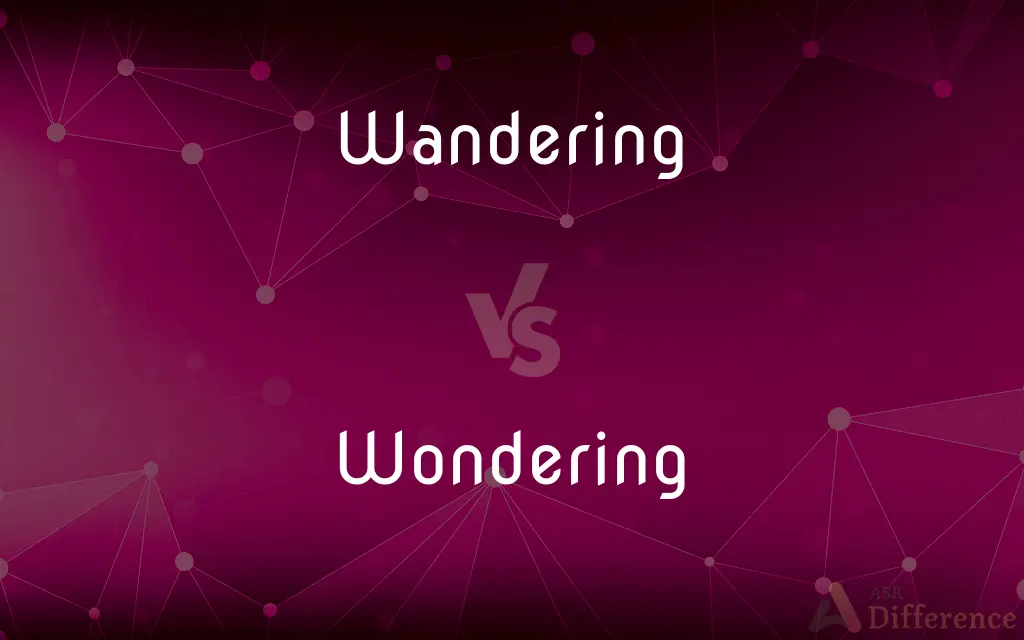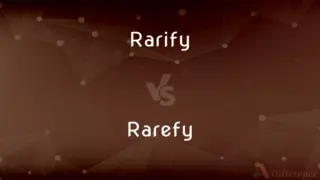Wandering vs. Wondering — What's the Difference?
By Tayyaba Rehman — Updated on November 2, 2023
Wandering means to move around without a fixed path or goal, while wondering refers to being curious or in a state of awe.

Difference Between Wandering and Wondering
Table of Contents
ADVERTISEMENT
Key Differences
Wandering involves physical movement, typically without a clear direction or purpose. It evokes images of exploration, meandering paths, or traveling without a specific destination in mind. Wondering, on the other hand, is an intellectual or emotional activity, where one ponders, is curious, or is in doubt about something.
While wandering can suggest a lack of direction, it can also reflect a sense of adventure or the desire for new experiences. On the contrary, wondering is the process of thinking, questioning, and contemplating possibilities, often leading to insights or deeper understanding.
Wandering is often used when describing someone’s aimless physical movements, as in someone wandering through the streets or the wilderness. Wondering, however, describes a mental action, such as wondering about the mysteries of the universe or the outcome of an event.
In literature, wandering is a theme that can symbolize the journey of life or a character’s search for meaning. In contrast, wondering might be used to express the character’s internal questions and their quest for knowledge.
Wandering can also have a metaphorical sense, describing someone's thoughts meandering, which brings it closer to the realm of wondering. Nevertheless, wondering will never mean physical movement but always refers to contemplation or inquiry within the mind.
ADVERTISEMENT
Comparison Chart
Definition
Moving without direction or purpose.
Thinking about something with curiosity.
Activity Type
Physical movement.
Mental contemplation.
Connotation
Can imply aimlessness or adventure.
Suggests curiosity, doubt, or reflection.
Usage in Literature
Symbolizes a physical journey or search.
Used to express internal questions or thoughts.
Common Phrases
"Wandering off the path," "wandering traveler."
"Wondering about life," "wondering if/what/how."
Compare with Definitions
Wandering
Moving slowly away from a main area or group.
The toddler was wandering away from the playground.
Wondering
Considering something with curiosity or awe.
She was wondering at the beauty of the starry sky.
Wandering
Traveling aimlessly from place to place.
He spent a year wandering across Europe.
Wondering
Pondering a question or possibility.
He spent the evening wondering how to solve the problem.
Wandering
Roaming freely and often idly.
The cattle were wandering in the open fields.
Wondering
Feeling doubt or a desire for an answer.
I was wondering if you'd like to join me for dinner.
Wandering
Drifting around without any fixed residence or plans.
After college, she went wandering before settling down.
Wondering
Expressing a polite inquiry or uncertainty.
I'm wondering whether you received my earlier message.
Wandering
Meandering without a definite course or objective.
Her mind kept wandering during the lecture.
Wondering
Exhibiting interest in understanding something.
She was wondering about the history of the ancient ruins.
Wandering
Travelling aimlessly from place to place; itinerant
A wandering preacher
Wondering
Characterized by or expressive of a desire to know something; curious
Unsure where she was leading to, I cast her a wondering look
Wandering
To move about without a definite destination or purpose.
Wondering
Feeling or expressing awe, admiration, amazement, or surprise.
Wandering
To go by an indirect route or at no set pace; amble
We wandered toward town.
Wondering
Present participle of wonder
Wandering
To proceed in an irregular course; meander
The path wanders through the park.
Wondering
The mental activity by which one wonders; a query, puzzlement, etc.
Wandering
To behave in a manner that does not conform to morality or norms
Wander from the path of righteousness.
Wondering
Full of questioning and consideration.
Wandering
To turn the attention from one subject to another with little clarity or coherence of thought
I had a point to make, but my mind started wandering.
Wondering
Showing curiosity;
If someone saw a man climbing a light post they might get inquisitive
Raised a speculative eyebrow
Wandering
To be directed without an object or in various directions
His eyes wandered to the balcony.
Wandering
To wander across or through
Wander the forests and fields.
Wandering
To be directed around or over
Her gaze wandered the docks.
Wandering
The act or an instance of wandering.
Wandering
Which wanders; travelling from place to place.
Wandering
Abnormally capable of moving in certain directions.
A wandering kidney; a wandering liver
Wandering
Travelling without preset route; roaming.
Wandering
Irregular turning of the eyes.
Wandering
Aimless thought.
Wandering
Straying from a desired path.
Wandering
Disordered speech or delirium.
Wandering
Present participle of wander
Wandering
Travelling about without any clear destination;
She followed him in his wanderings and looked after him
Wandering
(of groups of people) tending to travel and change settlements frequently;
A restless mobile society
The nomadic habits of the Bedouins
Believed the profession of a peregrine typist would have a happy future
Wandering tribes
Wandering
Of a path e.g.;
Meandering streams
Rambling forest paths
The river followed its wandering course
A winding country road
Wandering
Having no fixed course;
An erratic comet
His life followed a wandering course
A planetary vagabond
Common Curiosities
Is wondering always a solitary activity?
Not necessarily; people can share and discuss their wonderings with others.
What does it mean to go wandering?
It means to travel without a specific goal or direction.
What is it to be wondering about something?
It's to be curious or inquisitive about that thing.
Can animals be described as wandering?
Yes, animals can wander when they move about without apparent purpose.
Can wondering lead to discovery?
Absolutely, wondering is often the first step toward learning new information.
Is it correct to say "wandering thoughts"?
Yes, it describes thoughts moving without direction.
Can wandering be a planned activity?
It can start as a planned journey but involves unplanned movement.
Can wandering be used figuratively?
Yes, it can describe thoughts or discussions moving without focus.
Does wondering require an object or subject?
Yes, one must wonder about something.
How do you express curiosity formally using wondering?
"I was wondering if you might assist me."
Is wandering always a physical activity?
Primarily, yes, but it can refer to the mental process in a figurative sense.
Does wondering involve questioning?
Yes, it involves questions either asked outright or contemplated internally.
Can technology wander or wonder?
Technically, technology does not possess the ability to wander or wonder; these are human attributes.
Is there a phrase that combines both words?
Yes, "wandering and wondering" can describe physical travel with intellectual curiosity.
Does wandering imply being lost?
It can, but not necessarily; it may also be a chosen form of exploration.
Share Your Discovery

Previous Comparison
Rarify vs. Rarefy
Next Comparison
Lady vs. LaddyAuthor Spotlight
Written by
Tayyaba RehmanTayyaba Rehman is a distinguished writer, currently serving as a primary contributor to askdifference.com. As a researcher in semantics and etymology, Tayyaba's passion for the complexity of languages and their distinctions has found a perfect home on the platform. Tayyaba delves into the intricacies of language, distinguishing between commonly confused words and phrases, thereby providing clarity for readers worldwide.















































